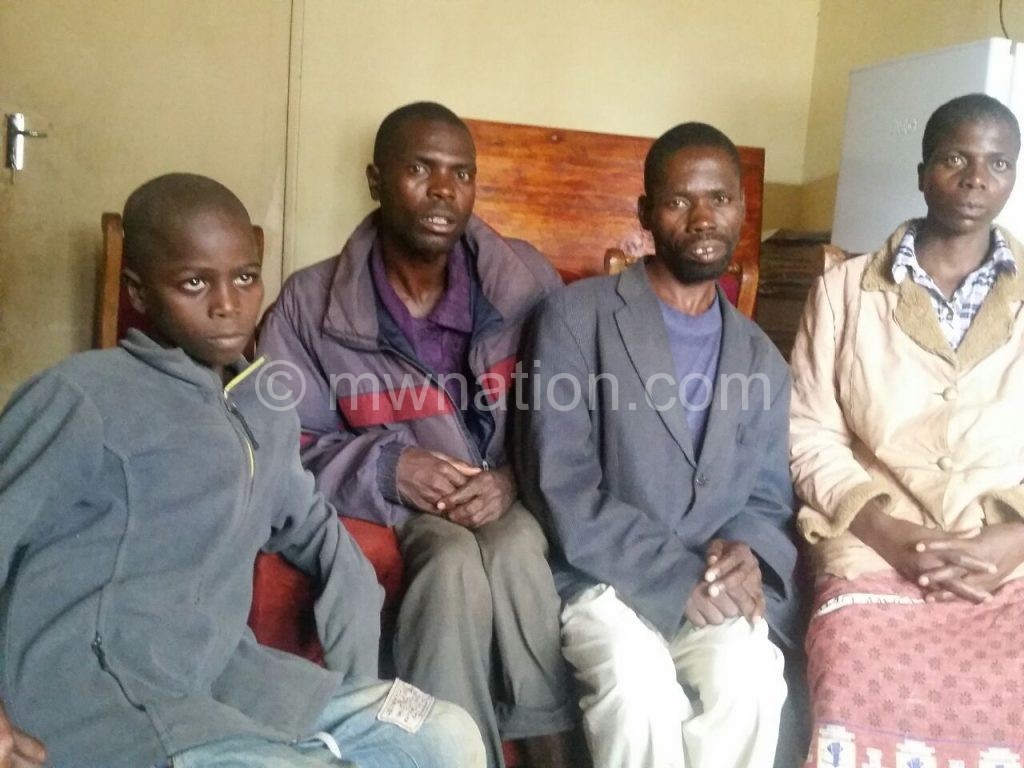The forgotten disaster
Ethel Khosa, 34, escaped death right in her house. The rains that caused a landslide in Masasa Township in Mzuzu was the genesis of her present situation.
With her two daughters, she was buried under mud and debris that forced a wall of their house to collapse in the middle of the night.

Two lives were lost. If it was not for her 11-year-old son Kondwani Zimba who singlehandedly rescued her, Khosa would have died together with her two children who were both below the age of 10.
Kondwani recalls how his mother looked when he rescued her.
“She was covered in mud. Blood had covered her face. I dug away the mud with bare hands until the head was visible. She was battling for breath when I rushed to the neighbours to tell them what had befallen us,” says Kondwani.
Khosa fainted during the rainstorm only to regain consciousness at Mzuzu Central Hospital where she was admitted for a day.
Immediately after being discharged from hospital, she travelled to Chikangawa in Mzimba to bury her daughters Loveness (12 months old) and Styness (eight years old).
“I was devastated,” says Khosa.
Two weeks after the disaster struck Mzuzu, life seems to be moving on as various stakeholders are preoccupied with distribution of relief items to the victims. The floods, which claimed six lives and displaced about 8 000 individuals, are fading in most people’s minds.
But for Khosa, there is a silent disaster that society may not see that it is eating her life away.
“Every time I see children, my heart sinks,” she says.
And the emotional pain is besides the physical pain she suffered.
“I am in pain. My body is aching heavily.
“Many well-wishers have given us relief items which have made our life bearable, but the pain of losing my children lingers on,” she says.
During the interview, Khosa had just moved away from a camp at Heaven is Here Church. Her husband, Cleanwell Zimba, had secured a house for which they are paying K5 000 a month.
The camp had no bathrooms. No shelter materials and food was inadequate.
“I feared my wife’s condition would get worse. The church has open windows which make the place very cold at night as we do not even have blankets,” said Zimba.
Khosa was visibly in pain, as she could barely talk or sit. She was more comfortable lying on a mat near a charcoal burner.
Her greatest concern is her health as she wonders: “How come I am feeling pain all over my chest when the hospital said I am fine?”
Even more disturbing is the fact that the Vice-President Saulos Chilima ordered authorities to consider taking her for further treatment, even if it means taking her to a private hospital.
“Nothing has happened to this day. Nobody has taken heed of the Vice-President’s order,” she says.
Several other victims interviewed at Heaven is Here Church Camp share Khosa’s story. They are failing to cope with life after the disaster.
“We don’t know what’s next after moving out of the camp,” says Lucy Phiri, a treasurer for a committee at the camp.
“We hear we will be relocated. But we don’t know where we will get money to build another house. We don’t know where we will get capital to start another business,” says Phiri.
Psychologists refer to the traumatic conditions the victims are going through as a forgotten disaster.
A psychologist at St John of God Hospital, Ndumanene Silungwe, says impact of natural disasters is on three levels: physical, psychological and social.
“The physical impact is the immediate. So, the victims need to be provided with basic needs to address that impact. If those are not available, they create insecurity, anxiety and depression among the victims,” he explains.
Silungwe says the other level, which equally needs attention, is psychological which involves emotional injuries.
“When everyone else has forgotten about the disaster, victims remain with psychosocial scars. And if the disaster leads to death, the scars cannot easily be erased,” he says.
Further, he says, victims maybe in denial as they are in shock, and failure to accept loss of property or loved ones creates other problems such as depression. He says people in such a situation may become aggressive, forgetful, lose concentration and are easily irritated.
“Long time effects include: abnormal behaviours that may include talking to themselves and are usually haunted by disaster memories.
“So, what is needed is to allow the victims to talk about their pain, fear and frustrations. This will relieve their burden. Then they need to be counselled that their life is the capital to move on,” he says.
Silungwe says those in frontline providing various services to the victims are also at risk of psychological challenges, especially when they are under pressure.
“These individuals need to work in shifts. Otherwise, they may end up frustrated and depressed if they are overwhelmed by their job,” he says.
When Chilima visited the victims recently, he ordered city council authorities to consider offering psychosocial support to the victims.
The council’s assistant director of health and social services Felix Namakhuwa says the council has engaged St John of God to provide support to the victims.
“The disaster has affected people’s lives in different ways. Some of the victims are affected psychologically such that they are refusing to eat or move to camps.
“As a council, we have decided to involve psychologists from St John of God to counsel them. We are mostly targeting the bereaved families, the injured and those showing strong signs of trauma,” says Namakhuwa.
However, Khosa and her family are yet to benefit from the initiative. Meanwhile, they continue to wonder what will happen next to them after losing their family members and property to the floods. n





